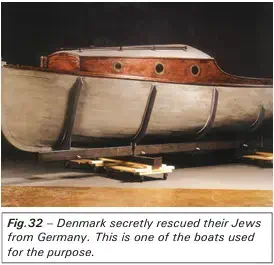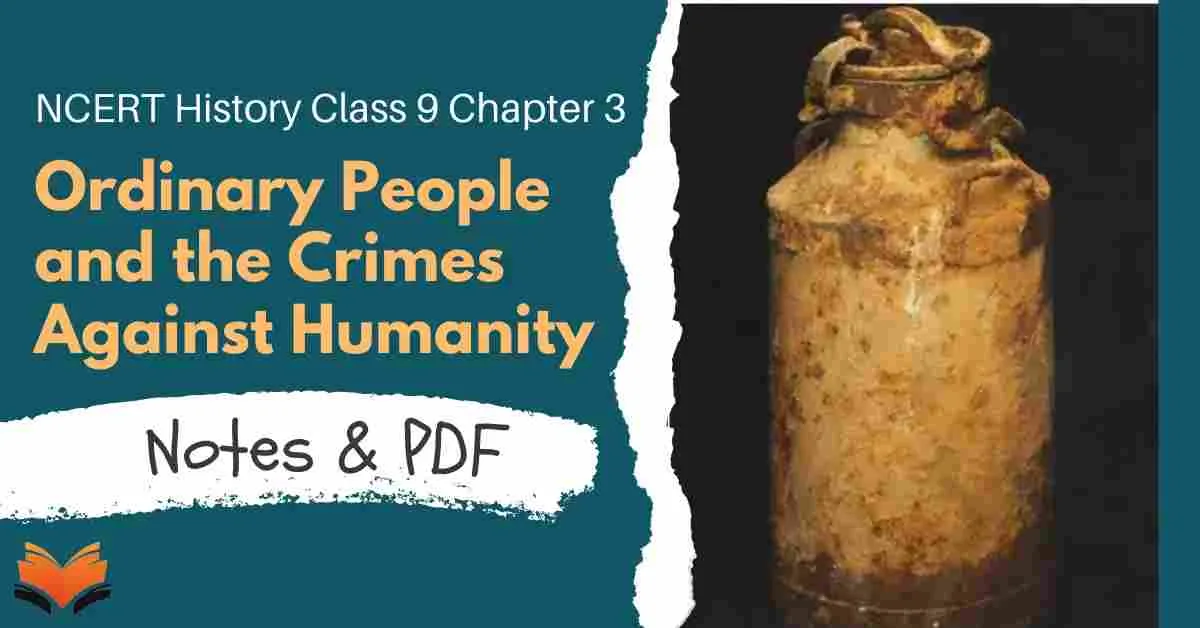Ordinary People and the Crimes Against Humanity – Concept & Notes PDF
Topic & sub-topics covered: Ordinary People and the Crimes Against Humanity and MCQs Questions: Nazism and the Rise of Hitler (All single detail notes are exam-oriented).
We have discussed in-depth and exam-oriented pointers that can be asked in the board exam of class 9th about the “Ordinary People and the Crimes Against Humanity” from the NCERT History notes for class 9th chapter 3rd “Nazism and the Rise of Hitler“.
Download the NCERT History for Class 9th Chapter 3 Nazism and the Rise of Hitler Notes PDF
NCERT History for Class 9th Chapter 3_ Nazism and the Rise of Hitler Notes & MCQ’s Question-Answer
Have you ever wondered how a failed artist like Hitler ended up becoming the dictator of all Germany? Class 9 NCERT History Chapter 3 “Nazism and the Rise of Hitler” tells exactly that story. When I first read it, I was honestly shocked by how bad things got in Germany after the Treaty of Versailles – crushing debt, unemployment, and hopelessness everywhere. Imagine the 1930s: people struggling to survive, feeling betrayed and angry… and then comes one man who turns all that frustration to his advantage. These notes capture the key events, from Nazi propaganda to the persecution of Jews, in a way that’s quick to revise but still gives you the “feel” of that time.
Download the NCERT History Class 9 Chapter 3 Nazism and the Rise of Hitler Notes PDF to make your exam preparation clear and effective. These notes explain the historical background of Germany after World War I, the rise of Adolf Hitler, and the impact of Nazi ideology on society and politics. Download now and strengthen your understanding of one of the most significant and impactful chapters in modern world history for Class 9.
Ordinary People and the Crimes Against Humanity

1. Common People’s Reaction to Nazism:
- Many ordinary Germans accepted Nazi ideas and spoke in Nazi language.
- Felt hatred and anger toward Jews on seeing them.
- Marked Jewish houses and reported suspicious neighbours.
- Believed Nazism would bring prosperity and improve general well-being.
2. Not All Germans Were Nazis:
- Some organised active resistance to Nazism despite police repression and risk of death.
- Majority were passive onlookers—scared to protest or oppose.
- Preferred to look away from Nazi crimes.
3. Pastor Niemoeller’s Observation:
- Highlighted silence of ordinary Germans during Nazi crimes.
- Famous lines show gradual targeting of groups (Communists → Social Democrats → Trade Unionists → Jews).
- Message: Indifference to injustice can lead to no one being left to defend you.
4. Jewish Experience in Nazi Germany:
- Charlotte Beradt recorded Jewish dreams in “The Third Reich of Dreams”.
- Jews began to internalise Nazi stereotypes about themselves.
- Dreamt of hooked noses, black hair, Jewish looks, body movements.
- Nazi propaganda images haunted them, even in dreams.
- Jews “died many deaths” before reaching gas chambers due to psychological torment.
5. Was Silence Only Due to Terror?
- Historian Lawrence Rees says No.
- Many Germans genuinely felt the 1930s brought hope and better living.
- Erna Kranz (teenager in 1930s) recalled:
a. Salaries increased.
b. Germany regained sense of purpose.
c. Described it as a “good time” for many.
Knowledge about the Holocaust

1. Revealing the Nazi Atrocities:
- Some information about Nazi practices leaked out during the last years of the regime.
- Full horrors became known only after Germany’s defeat in WWII.
2. Jews’ Determination to Preserve Memory:
- While Germans focused on their own post-war struggles, Jews aimed to make the world remember the Holocaust.
- Holocaust = Nazi killing operations targeting Jews.
- A ghetto inhabitant once said he wanted to outlive the war for just half an hour—to tell the world what happened.
3. Acts of Documentation in Ghettos & Camps:
- Many inmates wrote diaries, kept notebooks, and created archives.
- Shows an indomitable spirit to bear witness to Nazi crimes.
4. Nazi Efforts to Destroy Evidence:
- When the war seemed lost, Nazi leaders distributed petrol to functionaries.
- Purpose: Destroy incriminating evidence in offices.
- Legacy & Remembrance of the Holocaust
- Holocaust history survives in memoirs, fiction, documentaries, poetry, memorials, and museums worldwide.
- Serves as:
a. Tribute to those who resisted.
b. Embarrassing reminder to collaborators.
c. Warning to those who remained silent.
Mahatma Gandhi writes to Hitler
1. First Letter to Hitler (23 July 1939):
- Written from Wardha, Central Provinces, India.
- Gandhi addressed Hitler as “Dear Friend”.
- Friends urged Gandhi to write for the sake of humanity.
- Gandhi initially resisted, feeling it might be an impertinence (overstepping).
- He decided to appeal without calculating the outcome.
- Gandhi identified Hitler as the one person who could prevent a war that might push humanity back to a savage state.
- He questioned whether Hitler should pay such a high price for any goal, however worthy it seemed.
- Gandhi appealed as someone who had deliberately rejected war and had some success with this approach.
- Closed the letter with humility, asking forgiveness if he had erred.
2. Second Letter to Hitler (24 December 1940):
- Written again from Wardha.
- Gandhi stated that non-violence is a force that can match the most violent powers if organised.
- In non-violent struggle, there is no such thing as defeat—it is “do or die” without killing or hurting.
- Non-violence requires no large funds and no destructive science (weapons).
- Gandhi was astonished that Hitler did not realise violence was not anyone’s monopoly—other powers could improve and defeat him with his own methods.
- Warned that Hitler was leaving no proud legacy for his people.
- Stated that cruel deeds, no matter how skilfully executed, cannot be a source of pride.
- Urged Hitler in the name of humanity to stop the war.
Next & Previous Topics of NCERT/CBSE History Class 9 Chapter 3: Nazism and the Rise of Hitler
| Topics No. | Topics Name |
|---|---|
| 1 | Birth of the Weimar Republic |
| 2 | Hitler’s Rise to Power |
| 3 | The Nazi Worldview |
| 4 | Youth in Nazi Germany |
| 5 | Ordinary People and the Crimes Against Humanity |
MCQs on NCERT History Class 9 Chapter 3 Topic – Ordinary People and the Crimes Against Humanity
Here are the top exam-oriented MCQ-type questions on “Ordinary People and the Crimes Against Humanity” that you should prepare for your CBSE or state board exams:
Question 1. How did many ordinary Germans react to Nazism?
a) They rejected Nazi ideology completely
b) They saw the world through Nazi eyes and adopted Nazi language
c) They remained unaware of Nazi activities
d) They fled Germany immediately
Answer: b) They saw the world through Nazi eyes and adopted Nazi language
Question 2. What did many Germans do when they saw someone who looked like a Jew?
a) Helped them escape
b) Marked their houses and reported them
c) Invited them to meetings
d) Ignored them completely
Answer: b) Marked their houses and reported them
Question 3. Who was Pastor Niemoeller?
a) A Nazi propagandist
b) A resistance fighter against Nazism
c) A Jewish ghetto inhabitant
d) A Nazi army officer
Answer: b) A resistance fighter against Nazism
Question 4. What was the main observation of Pastor Niemoeller about ordinary Germans?
a) They actively supported Nazis
b) They showed an absence of protest and silence
c) They revolted against the regime
d) They escaped to other countries
Answer: b) They showed an absence of protest and silence
Question 5. What was Charlotte Beradt’s book “The Third Reich of Dreams” about?
a) Nazi war strategies
b) Secret Jewish resistance movements
c) Dreams of Jews under Nazi rule
d) Hitler’s speeches
Answer: c) Dreams of Jews under Nazi rule
Question 6. What did Jewish people sometimes start believing due to Nazi propaganda?
a) Nazi racial stereotypes about themselves
b) Their equality in German society
c) That the war would soon end
d) That Hitler supported them
Answer: a) Nazi racial stereotypes about themselves
Question 7. What does Lawrence Rees’s documentary “The Nazis: A Warning from History” suggest about Germans’ support for Hitler?
a) It was purely because of fear
b) It was also because life seemed to improve in the 1930s
c) It was due to foreign influence
d) It was entirely for military pride
Answer: b) It was also because life seemed to improve in the 1930s
Question 8. What is the term for the mass killing operations of Jews by the Nazis?
a) Blitzkrieg
b) Holocaust
c) Kristallnacht
d) Pogrom
Answer: b) Holocaust
Question 9. How did Jews in ghettos and camps preserve the memory of Nazi atrocities?
a) By creating paintings only
b) By destroying Nazi documents
c) By writing diaries, keeping notebooks, and creating archives
d) By sending letters abroad
Answer: c) By writing diaries, keeping notebooks, and creating archives
Question 10. What did the Nazi leadership do when they realised the war was lost?
a) Surrendered peacefully
b) Distributed petrol to destroy evidence
c) Released prisoners from camps
d) Fled to other countries immediately
Answer: b) Distributed petrol to destroy evidence
Question 11. In what forms does the history and memory of the Holocaust survive today?
a) Only in history textbooks
b) In memoirs, fiction, documentaries, poetry, memorials, and museums
c) Only in court records
d) Only in survivor interviews
Answer: b) In memoirs, fiction, documentaries, poetry, memorials, and museums
Question 12. Who wrote letters to Adolf Hitler appealing for peace?
a) Jawaharlal Nehru
b) Mahatma Gandhi
c) Subhas Chandra Bose
d) Winston Churchill
Answer: b) Mahatma Gandhi
Question 13. In Gandhi’s 1939 letter to Hitler, what did he urge Hitler to do?
a) Continue the war for national pride
b) Prevent a war that could destroy humanity
c) Ally with Britain
d) Focus on economic reforms
Answer: b) Prevent a war that could destroy humanity
Question 14. In Gandhi’s 1940 letter, what did he describe as a force that could match violent powers?
a) Democracy
b) Non-violence
c) Education
d) Economic progress
Answer: b) Non-violence
Question 15. According to Gandhi, what was the flaw in Hitler’s legacy?
a) Lack of political unity
b) A record of cruel deeds
c) Economic mismanagement
d) Dependence on foreign support
Answer: b) A record of cruel deeds

